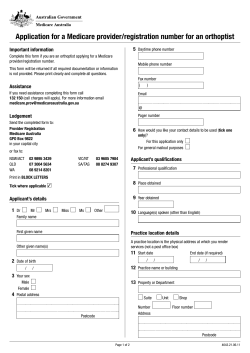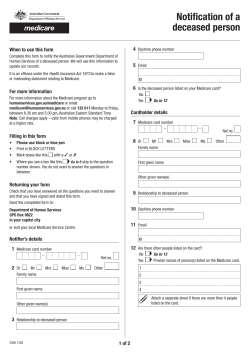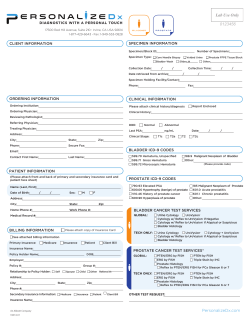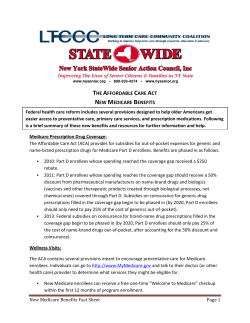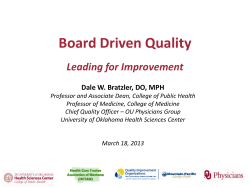
Medicare for Children Get more information Know your rights
K n o w yo u r r i g h t s Other ways to pay health care costs G et more information If you have Medicare, you have certain guaranteed rights to help protect you. One of these is the right to a process for appealing decisions about health care payment or services. Whether you have Original Medicare or a Medicare Advantage Plan (like an HMO or PPO), you have the right to appeal and to file grievances. In addition to Medicare, your state may have programs that offer additional help to cover your child’s health care costs. Call your State Medical Assistance (Medicaid) office to get information about these programs: You can view or print Medicare products, find helpful phone numbers and websites, and compare dialysis facilities in your area by visiting Medicare.gov or calling 1-800-MEDICARE (1‑800‑633‑4227). TTY users should call 1-877-486-2048. • • • • • To learn more details about eligibility, coverage, cost information, and how Medicare works with other insurance, visit Medicare.gov/people-like-me/esrd/esrd.html. End Stage Renal Disease (ESRD) Networks and State Survey Agencies work together to help you with complaints (grievances) about your dialysis or kidney transplant care. Medicare Prescription Drug Coverage (Part D) Medicare also offers prescription drug coverage for everyone with Medicare, generally for an additional cost (premium). This would cover immunosuppressive and oral only drugs, but only if Part B doesn’t cover them. To get Medicare drug coverage for your child, your child must be eligible for Medicare, and you must enroll your child in a Medicare drug plan. These plans are run by private insurance companies or other companies approved by Medicare. Each plan can vary in cost and drugs covered. Medicare Savings Programs Medicaid Children’s Health Insurance Program (CHIP) Kidney Disease Programs What you pay • To find a Medicare-approved dialysis facility in your area, and get helpful resources, visit Dialysis Facility Compare at Medicare.gov/dialysis. Generally, Part A pays for inpatient hospital services, and you pay a one-time yearly deductible. • For free health insurance counseling and personalized help, call your State Health Insurance Assistance Program (SHIP).* For Part B services, Medicare generally pays 80% of the Medicareapproved amount, after you pay the Part B yearly deductible. You pay the remaining 20% coinsurance. This is in addition to the Part B monthly premium. • To get a report on a particular dialysis facility, call your ESRD State Survey Agency.* • For more information on dialysis and transplants, or to file a grievance, call your state’s ESRD Network.* If your child has other insurance, your costs may be different. For dialysis services, the amount you pay may vary based on your child’s age and the type of dialysis they need. *Visit Medicare.gov/contacts or call 1-800-MEDICARE to get the phone numbers for your local SHIP, State Survey Agency, or ESRD Network. . Medicare for Children with End-Stage Renal Disease G E T T I N G S T A R T E D When Medicare coverage ends If your child is eligible for Medicare only because of permanent kidney failure, Medicare coverage will end: • 12 months after the last month of dialysis treatments • 36 months after the month of a kidney transplant Medicare coverage will resume if your child meets certain conditions. Medicare.gov/dialysis CMS Product No. 11392 Revised March 2014 CENTERS FOR MEDICARE & MEDICAID SERVICES F inding out your son or daughter has End-Stage Renal Disease (ESRD) (permanent kidney failure requiring dialysis or a kidney transplant) is hard. You may have questions about his or her health condition and treatment options. Your child’s health care team can help answer these questions. You may also be concerned about paying for the health care costs that come with this disease. Medicare can help cover your child’s health care costs. Even if you currently have other health insurance, enrolling your child in Medicare can provide consistent protection for them if you lose your other coverage in the future. Medicare covers most kidney transplant related services. Note: A child is defined as an unmarried person younger than 22 (or a person who’s between the ages of 22 and 26, and who meets other requirements). Also, he or she must be your biological child, legally adopted child, stepchild (for at least one year), or a grandchild or step-grandchild (in some cases). W H A T ’ S How to tell if your child is eligible One of these conditions must apply to you: One of these conditions must apply to your child: You (or your spouse) have earned at least 6 credits within the last 3 years by working and paying Social Security taxes. Your child needs regular dialysis because his or her kidneys no longer work. You (or your spouse) are getting, or are eligible for Social Security or Railroad Retirement Board benefits. AND Your child has had a kidney transplant. If you determine your child is eligible, then you or your child must enroll in Medicare and satisfy the waiting period (unless an exception applies) to get benefits. To enroll your child in Medicare, or to get more information about eligibility, call or visit your local Social Security office. You can call Social Security at 1-800-772-1213 to make an appointment. TTY users should call 1-800-325-0778. If you visit your local Social Security office, you might be asked to bring these documents: • Your child’s birth certificate and Social Security card. • Your Social Security card. “Medicare for Children with End-Stage Renal Disease: Getting Started” isn’t a legal document. Official Medicare Program legal guidance is contained in the relevant statutes, regulations, and rulings. More details are available in the “Medicare Coverage of Kidney Dialysis & Kidney Transplant Services” booklet • CMS Form 2728 (“End-Stage Renal Disease Medical Evidence Report Medicare Entitlement and/or Patient Registration”). You can get this form from your child’s doctor or dialysis unit, or by visiting Cms.gov/cmsforms/downloads/CMS2728.pdf. Medicare helps pay for kidney dialysis and kidney transplant services. Your child will need Medicare Part A (Hospital Insurance), Medicare Part B (Medical Insurance), and possibly Medicare Part D (Prescription Drug Coverage) in order to get the full benefits available to them. Kidney dialysis If your child is an inpatient at a hospital, Part A covers dialysis treatments, and Part B covers doctors’ services. If your child is an outpatient at a hospital, Part B helps pay for these dialysis services: • Outpatient dialysis treatments (in a Medicare-approved dialysis facility) • Home dialysis equipment and supplies • Certain home support services • Most injectable drugs and their oral forms for outpatient or home dialysis (like an erythropoiesis stimulating agent to treat anemia) • Doctors’ services (inpatient or outpatient) • Other services that are part of dialysis (like laboratory tests) Your child can get dialysis at any Medicare-approved facility in the U.S. Note: In most cases, Medicare doesn’t pay for transportation to dialysis facilities. M e d i c a r e . g o v 1 - 8 0 0 - M E D I C A R E C O V E R E D Kidney transplant Generally, Part A covers these transplant services: • Inpatient services in an approved hospital • Kidney registry fee • Laboratory and other tests needed to evaluate your child’s medical condition and the condition of potential kidney donors • The costs of finding the proper kidney for your child’s transplant surgery • The full cost of care for your child’s kidney donor • Blood (if a transfusion is needed) Part B helps pay for these transplant services: • Doctors’ services for kidney transplant surgery • Doctors’ services for the kidney donor during his or her hospital stay • Immunosuppressive drugs (generally for a limited time after your child leaves the hospital following a transplant) • Blood (if a transfusion is needed)
© Copyright 2025

